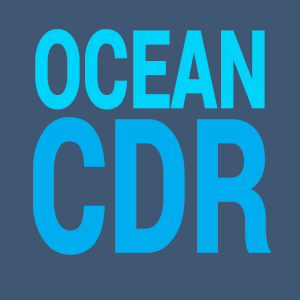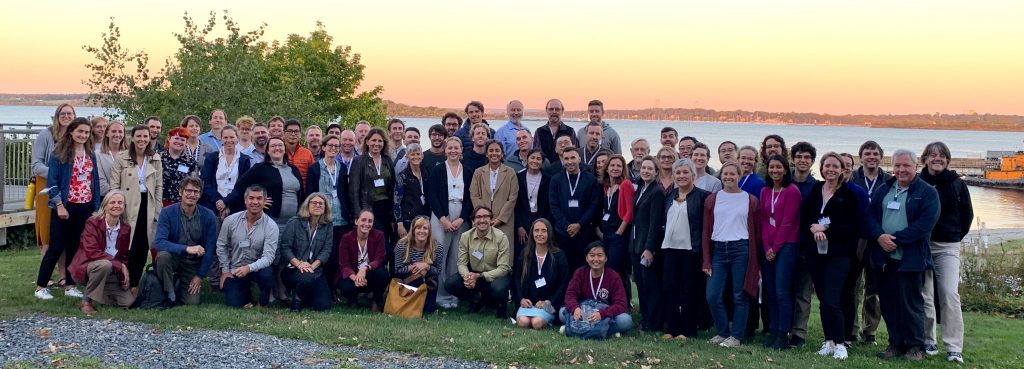

WORKSHOP AGENDA
Click to view the meeting agenda
Location: URI Bay Campus, Coastal Institute, and Mosby Center.
Scroll down for
Program Overview
Code of Conduct
Logistics
Recommend Reading
The OCB community has the broad and deep scientific expertise needed to create sensible, transparent, and reproducible practices around Measuring, Reporting and Verifying (MRV) carbon removal by the ocean. This in-person workshop (with remote access to plenary talks) was designed for those with background knowledge in marine CDR already so we can collectively grapple with the science needed to measure and verify CDR in marine environments. At this workshop, we convened 5 main topical sessions (each including 1-2 keynote talks, an expert panel, smaller group breakout discussions, and time for side conversations and networking) as follows:
Session 1. MRV lessons from land-based CDR, blue carbon, and ocean acidification research - Review and discuss the MRV organizational and regulatory structures that could be applied to the field of marine CDR, and the data and research requirements that result. Confirmed speakers and panelists to date include Simon Freeman (ARPA-E), Calden Stimpson (Booz Allen Hamilton/ARPA-E), Patty Oikawa (CSU East Bay, virtual), Nora Cohen Brown (Charm Industrial, virtual), Patrick Duke (Univ. Victoria), Matthew Eisaman (Stony Brook Univ.), Stephanie Arcusa (Arizona State Univ., virtual)
Session 2. Developing MRV recommendations for mCDR (Sept. 27 afternoon) - Agency and foundation representatives will share recommendations about current and future directions for MRV research and support, with discussion. Confirmed speakers and panelists to date include Kenneth Buesseler (WHOI), Freya Chay (CarbonPlan), David Koweek (Ocean Visions), Savita Bowman (ClearPath)
Session 3. Models, Methods, and Measurements (2-part session) - Apply core OCB expertise to assess the numerical and observational tools that are best applied to the MRV problem, addressing quantification, additionality, durability, and scalability of marine CDR approaches.
Part 1. Permanence - Confirmed speakers and panelists to date include Matt Long (NCAR), Adrienne Sutton (NOAA/PMEL, virtual), Patrick Rafter (UCI), Zeke Hausfather (Stripe, virtual), Veronica Tamsitt (USF), Cara Manning (UConn)
Part 2. Sea-Air Flux - Confirmed speakers and panelists to date include David Ho (Univ. Hawai'i), Galen McKinley (LDEO), Hongjie Wang (URI), Dariia Atamanchuk (Dalhousie), Jaime Palter (URI)
Session 4. MRV in an Ecosystem Context - Consider how the ecosystem responses to CDR efforts influence MRV, and how these responses can themselves be measured. Confirmed speakers and panelists to date include Lennart Bach (Univ. Tasmania), Mar Fernández-Méndez (AWI, virtual), Adam Subhas (WHOI), Katja Fennel (Dalhousie)
Session 5. MRV - Investigate the barriers and risk management for marine CDR. Confirmed speakers and panelists to date include Anu Khan (Carbon180), Sarah Cooley (Ocean Conservancy), Nick Record (Bigelow Laboratory), Marion Hourdequin (Colorado College, virtual), Holly Buck (Univ. at Buffalo, virtual)
Synthesis and Future Directions - On the final morning of the workshop, participants will engage in synthetic discussions that focus on key outcomes and action items that will inform the scope and activities of a focused OCB mCDR working group that will be formed after the workshop.
This workshop was convened by a scientific organizing committee and the Ocean Carbon Biogeochemistry (OCB) Program in collaboration with the US Carbon Cycle Science Program and the North American Carbon Program (NACP), which are currently developing a CDR Academy to help establish a baseline shared knowledge of CDR concepts in preparation for a workshop in 2023. Learn more here.
This workshop focused on the scientific underpinnings of frameworks supporting Measurement, Reporting, and Verification (MRV) for marine carbon dioxide removal (mCDR) over a range of spatiotemporal scales. One workshop objective was to identify key knowledge gaps and technical limitations that our marine-ecosystem-focused research community should seek to address. Over 4 days of themed sessions, attendees with different perspectives from academia, private industry, non-profits, government, and local communities had the opportunity to participate in an open dialog on the requirements for effective MRV. All speakers and panelists were expected to disclose any relationships (including remunerated engagements and collaborations) with companies and not-for-profit organizations in the CDR realm. While descriptions of new and emerging technologies are welcome, participants were asked to refrain from promotional activities with a commercial aim and to avoid dismissive judgments of specific mCDR approaches. Instead, we aimed to foster constructive discussions that:
Advance our collective scientific understanding of different mCDR approaches, their potential efficacy and impacts on marine ecosystems and human communities;
Identify best practices to guide research to support MRV for mCDR, including quantifying and communicating uncertainty;
Equip participants with broader knowledge of environmental justice considerations and guidance for integrating affected sectors and local communities in mCDR research.
As with all activities sponsored by OCB, the Program Code of Conduct applies to all participants, staff, and support personnel of the workshop.